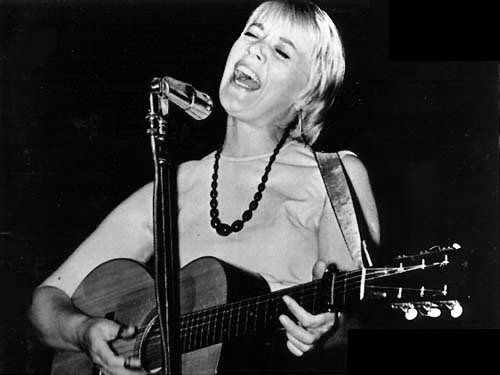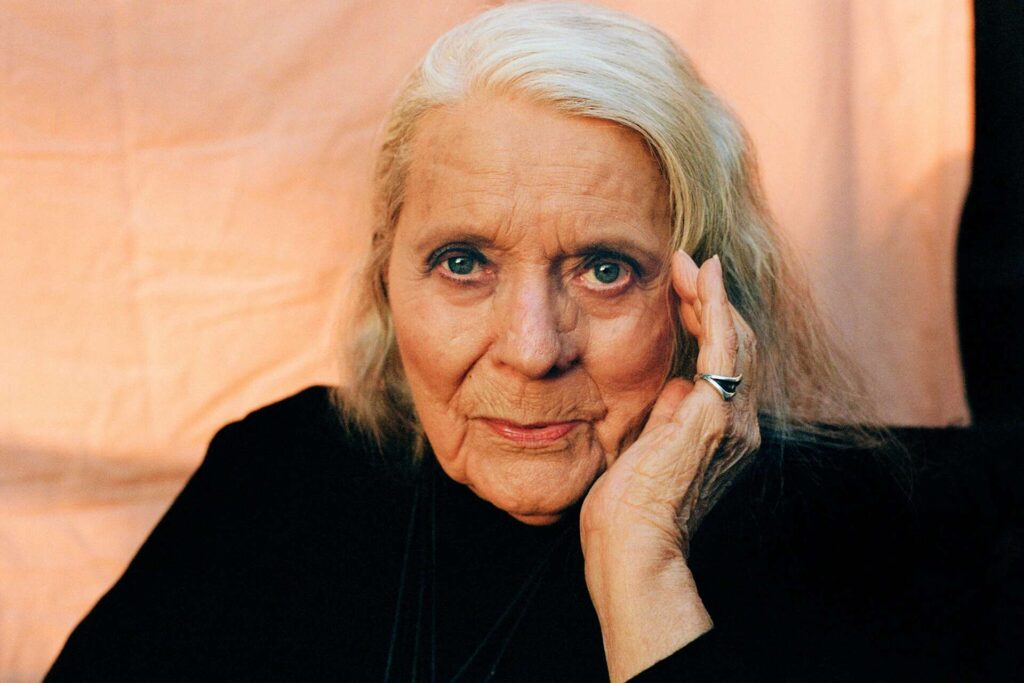
Barbara Dane (born Barbara Jean Spillman on May 12, 1927 – October 20, 2024) was an influential American folk, blues, and jazz singer, guitarist, record producer, and political activist whose impact spanned several decades.
Known for her distinctive voice, fearless commitment to social justice, and ability to traverse musical genres, Dane’s work left an indelible mark on American music and activism. Over her long career, she not only performed with many of the giants of jazz and blues but also actively participated in movements for civil rights, labor rights, peace, and international solidarity.
Early Life and Musical Beginnings
Born in Detroit, Michigan, Barbara Dane grew up in a working-class family during the Great Depression. Her early exposure to music came from listening to the blues and jazz artists who shaped the Detroit music scene, as well as folk songs that reflected the struggles of ordinary people. Her interest in music developed alongside her deepening awareness of social and economic inequalities. From a young age, Dane understood the power of music as a vehicle for change. This understanding would shape her entire career.
By the time she reached her teenage years, Barbara Dane’s voice had already begun to attract attention. A striking contralto with both strength and sensitivity, Dane’s voice was a natural fit for the blues, which became one of her core genres. However, it was also during this time that her political consciousness began to form. She became involved in activism during World War II, speaking out against fascism and racism, and later became deeply invested in civil rights and labor movements. Her dual passions for music and social justice would become inextricably linked throughout her life.
Folk, Blues, and Jazz: A Musical Journey
Barbara Dane’s formal musical career began in the 1950s when she moved to San Francisco. She became immersed in the city’s burgeoning folk and jazz scene, performing in clubs and coffeehouses, and gaining a following for her powerful voice and politically charged performances. She was especially noted for her versatility, effortlessly moving between genres like folk, blues, and jazz. She frequently collaborated with key figures in these genres, including blues greats like Muddy Waters, Lightnin’ Hopkins, and Memphis Slim, as well as jazz musicians such as Louis Armstrong, Earl “Fatha” Hines, and Jack Teagarden.
Her ability to sing across genres allowed Dane to carve out a unique space in the American music landscape. Whether interpreting traditional folk songs or delivering a soulful blues performance, Dane brought an emotional depth and authenticity to her work. Her musicality was informed not just by her talent but by her deep empathy for the struggles of the oppressed. This gave her songs an urgency and a relevance that resonated with audiences far beyond the world of entertainment.
In 1959, Louis Armstrong famously remarked, “Did you get that chick? She’s a gasser!” Dane’s collaborations with jazz musicians in the late 1950s and early 1960s earned her considerable acclaim, but her commitment to activism often overshadowed the commercial potential of her music. Unlike many artists of her time, Dane refused to separate her art from her political convictions. Rather than chasing stardom, she used her platform to speak out against injustice, aligning herself with progressive and radical causes.
Political Activism and Social Justice
Barbara Dane’s music was inseparable from her politics, and she was deeply involved in the civil rights movement of the 1950s and 1960s. She participated in marches and rallies, using her music as a form of protest and inspiration. She also sang at labor rallies, peace protests, and anti-war demonstrations. During the height of the Vietnam War, Dane became one of the most vocal opponents of U.S. military intervention in Southeast Asia, and she performed at countless anti-war events, often at great personal and professional risk.
Her outspoken activism sometimes alienated mainstream music industry figures and limited her commercial success. Major labels and promoters often distanced themselves from her because of her radical political views, but Dane never wavered in her commitment. She understood that her music could be a powerful tool for raising awareness and mobilizing people to action. In this way, she saw her role as both a musician and a social activist as complementary, each informing and reinforcing the other.
In 1966, Barbara Dane made history as the first American musician to tour post-revolutionary Cuba, performing for Cuban audiences and forging ties with revolutionary musicians and intellectuals. Her tour in Cuba further solidified her commitment to anti-imperialist and socialist causes, and she continued to support Cuba despite the U.S. government’s hostility towards the country. This act was a clear demonstration of her willingness to align herself with the marginalized and the oppressed, even when it was not popular to do so.
.
.
Paredon Records and Documentary Music
In 1970, Barbara Dane co-founded Paredon Records with her husband, Irwin Silber, a noted historian and political activist. Paredon was more than just a record label; it was a cultural and political project aimed at documenting revolutionary and protest music from around the world. Over the course of its existence, Paredon released over 50 albums featuring artists from a wide array of countries and movements, from the Chilean Nueva Canción to the African liberation movements.
Paredon Records became a significant outlet for politically conscious music that was often ignored by mainstream labels. The label released albums that chronicled the struggles for independence in Latin America, Africa, and Asia, as well as the civil rights and anti-war movements in the United States. Dane herself recorded several albums for Paredon, including the deeply political I Hate the Capitalist System (1973), which became one of her most famous works. The album was a stark critique of economic injustice and remains a powerful example of music as a form of political dissent.
In creating Paredon, Dane helped to preserve and disseminate songs of protest and revolution, ensuring that the voices of those fighting for justice were heard far beyond their immediate communities. She saw music as a universal language that could build solidarity across borders, and through Paredon Records, she amplified the voices of people struggling for freedom and equality around the world.
Legacy and Influence
Barbara Dane’s influence extended far beyond her music. As a pioneering artist who straddled the worlds of folk, blues, jazz, and protest music, she defied categorization and challenged the boundaries of what a politically engaged musician could be. Her activism, combined with her genre-crossing career, made her a singular figure in American cultural history.
Throughout her life, Dane remained dedicated to using music as a tool for social change. She continued performing well into her later years, often appearing at political rallies and benefits for causes she believed in. Even as her health began to decline, she never stopped advocating for justice and equality, inspiring generations of musicians and activists to follow in her footsteps.
Dane’s work also helped to lay the groundwork for the fusion of music and activism that would become a hallmark of the 1960s and 1970s protest movements. Artists like Joan Baez, Pete Seeger, and later, artists in the 21st century, have drawn from the template Dane created—using their platforms to speak out against war, racism, sexism, and economic injustice. Her commitment to fighting for a better world, coupled with her artistry, left an indelible impact on the music community and the political landscape alike.
.

.
In 2018, at the age of 91, Barbara Dane published her autobiography, This Bell Still Rings: My Life of Defiance and Song, in which she reflected on her lifelong journey as an artist and activist. The book chronicled her remarkable life, highlighting her unflagging commitment to justice and her belief in the transformative power of music.
Conclusion
Barbara Dane’s life and work exemplify the power of art as a form of resistance. She was a trailblazer, using her voice—both literally and figuratively—to challenge oppression and inspire action. Her career spanned over seven decades, during which she influenced countless artists and activists with her uncompromising stance on justice, her deep empathy for the downtrodden, and her extraordinary talent as a singer and performer. Through her music, her activism, and her role as co-founder of Paredon Records, Barbara Dane ensured that the struggles of people across the world would not be forgotten. In doing so, she cemented her legacy as one of the most important voices in American folk, blues, jazz, and political music.
On October 20, 2024, Barbara Dane, who had heart failure, died through assisted suicide at her home in Oakland, under the provisions of the California End of Life Option Act. She was 97.
Her passing marked the end of an era, but her contributions to both music and activism will resonate for generations to come.
Check out Barbara Dane on Amazon.
If you found this interesting please share it with your friends and family, and why not check out some of our other articles on Musicians who died in 2024.
.

